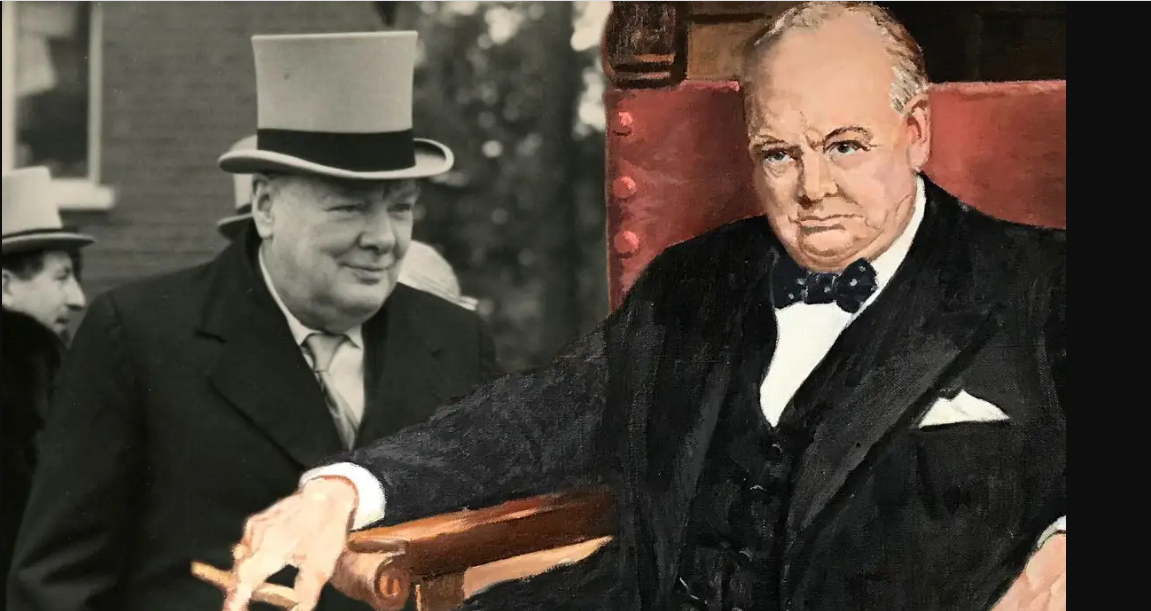Winston Churchill Biography – Winston Churchill, born on November 30, 1874, at Blenheim Palace, Oxfordshire, England, is a name that resonates through the annals of history. This biography explores the life and times of a man who was not only the Prime Minister of the United Kingdom during critical periods such as World War II (1940–45) and the early Cold War years (1951–55) but also a celebrated orator, a prolific writer, and a Nobel laureate in Literature.
Winston Churchill Bio Data:
| Attribute | Details |
|---|---|
| Full Name | Winston Leonard Spencer-Churchill |
| Birth Date | November 30, 1874 |
| Death Date | January 24, 1965 |
| Occupation | Statesman, orator, author |
| Political Offices | Prime Minister of the UK (1940–45, 1951–55) |
| Education | Harrow School, Royal Military Academy |
Early Life and Upbringing
Born into the distinguished Spencer family, Winston Leonard Spencer-Churchill was the son of Lord Randolph Churchill, a prominent Tory politician, and Jennie Jerome, an American socialite. From an early age, Churchill faced the pressures and expectations of his noble lineage. Despite a somewhat turbulent and lonely childhood, his attachment to his nanny, Mrs. Everest, provided him with the much-needed emotional support.Churchill’s education at Harrow School was less than stellar, and his academic records were predominantly mediocre. However, his determination to succeed led him to the Royal Military Academy Sandhurst, where he graduated 20th in a class of 130.
Military and Journalistic Beginnings
Winston Churchill’s early career was marked by a blend of military service and journalism, an unusual combination that played a pivotal role in shaping his future. His journey began when he graduated from the Royal Military Academy Sandhurst in 1895 and was commissioned as a cornet (second lieutenant) into the Fourth Queen’s Own Hussars. This role offered him the traditional path of a British army officer but did not fully satisfy his thirst for adventure and influence.
Driven by a profound desire to see and shape the world, Churchill sought opportunities beyond the confines of routine military duties. This quest led him to work as a war correspondent, a role that catered to his ambitions and skills. His first foray into journalism took him to Cuba in 1895, where he reported on the Cuban War of Independence against Spain for the Daily Graphic. His articles, which detailed the rigors of war and the strategies employed, drew significant public attention and marked the beginning of his lifelong engagement with the press.
Churchill’s journalistic career took him next to British India, where he served both as an officer and a correspondent. His reports highlighted his keen observations of military life and colonial administration, further enhancing his reputation. In 1898, he joined the British expedition to the Sudan to participate in the Battle of Omdurman, which he documented in his book “The River War,” offering insights into British imperial military endeavors and strategies.
Perhaps most notably, Churchill’s coverage of the Second Boer War in South Africa catapulted him into the limelight. His daring escape from a Boer prisoner of war camp in 1899 made headlines around the world, dramatically boosting his public profile. These experiences not only fulfilled his adventurous spirit but also honed his skills in narrative construction, crucial for his later political speeches and writings.
Through his military engagements and journalistic exploits, Churchill developed a robust public persona characterized by a relentless pursuit of adventure and a deep understanding of military strategy and international politics. These early experiences laid a solid foundation for his later roles in government and during critical moments on the world stage, where his leadership would be defined by the same boldness and strategic acumen first displayed in his writings and military service.
Political Ascent
Entering politics in 1900, Churchill served as a Conservative MP for Oldham. His early career was marked by frequent party changes, from Conservative to Liberal and back, reflecting his independent spirit and his disagreements with party policies, particularly on issues like free trade and social reform. As a Liberal, he championed progressive social policies and was instrumental in the development of the welfare state through roles such as President of the Board of Trade and Home Secretary. His tenure as First Lord of the Admiralty saw him prepare the Royal Navy for World War I, although his involvement in the Gallipoli campaign would tarnish his reputation.
The Wilderness Years and WWII Leadership
After being sidelined in the political arena during the 1920s and early 1930s, which he referred to as his “wilderness years,” Churchill’s persistent warnings against the rise of Nazi Germany brought him back to prominence. Reappointed as First Lord of the Admiralty on the outbreak of World War II, he soon became Prime Minister in 1940.
His leadership during the war was characterized by remarkable speeches that rallied the British public, and his strategic acumen was crucial in forming and sustaining the Allied coalition with the United States and the Soviet Union. Post-war, he was defeated in the 1945 general election but returned to office in 1951, continuing to influence world affairs during the early Cold War.
Legacy and Impact
Churchill’s impact on the twentieth century is immense. Not only did he lead Britain through its darkest hours, but his speeches and writings continue to inspire to this day. He passed away on January 24, 1965, in London, leaving behind a legacy as one of the greatest leaders in modern history. His state funeral was a testament to his significant role on the global stage, attended by dignitaries from around the world.
Churchill’s life and career were marked by his resilience, his ability to inspire people in times of hardship, and his contributions to the fabric of modern democracy. His foresight and policies shaped much of today’s geopolitical landscape, making his biography not just a story of a man but of a pivotal era in world history.
